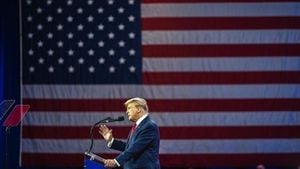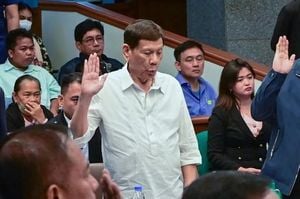From October 22 to 24, 2024, Kazan, Russia, hosted the 16th BRICS Summit, marking not only the first in-person reunion of BRICS leaders since its significant expansion but also showcasing the bloc's commitment to fostering greater global cooperation. With newly invited member nations joining and established leaders gathering, this event underscored the growing influence of BRICS—an organization originally composed of Brazil, Russia, India, China, and later joined by South Africa, Iran, Egypt, and other nations. It now collectively embodies almost half of the world's population, highlighting the bloc's importance as it seeks to promote peace, development, and equity on the international stage.
Chinese President Xi Jinping opened the summit with renewed calls for unity and collaboration among BRICS nations, emphasizing the need for high-quality development. "We must build on this milestone summit to set off anew and forge ahead with one heart and one mind," he stated. Xi proposed five key suggestions, urging member states to hail the pillars of peace, innovation, green development, justice, and enhanced exchanges among the people.
Echoing Xi's sentiments, Russian President Vladimir Putin emphasized the significance of this summit amid the backdrop of geopolitical tensions and economic uncertainties. He warned against the risks of unilateral sanctions and underscored the necessity of utilizing national currencies for trade and investment—a strategy aimed at reducing dependency on Western financial systems.
Both leaders, alongside figures like Egyptian President Abdel Fattah al-Sisi and South African President Cyril Ramaphosa, discussed various global issues during the talks, including climate change, sustainable development, and reforming global economic governance. Al-Sisi highlighted BRICS’s role as integral to developing countries, pushing for innovative financing solutions aimed at building a multipolar international system.
One of the summit's primary outcomes was the Kazan Declaration, reinforcing the bloc's commitment to fostering multilateralism and enhancing cooperation. According to this declaration, accessibility to diverse financing methods would be prioritized to support sustainable development, particularly for countries grappling with economic challenges.
A broader focus was placed on the establishment of the New Development Bank (NDB), which aims to provide financial support for infrastructure and sustainable development projects across member countries. BRICS leaders agreed to support the NDB's strategy for the upcoming years and promote local currency financing, addressing the need for less reliance on traditional Western-focused financial institutions.
During the summit, discussions underscored the capabilities of BRICS to act as a platform for creating alternatives to existing systems dominated by developed nations. The leaders collectively condemned the “disruptive effects of unlawful unilateral coercive measures,” which they view as detrimental to the global economy. This reflects the bloc's aspiration to carve out more equitable pathways for economic interaction among developing nations.
Still, challenges remain. Venezuelan President Nicolás Maduro, participating alongside leaders from various nations, called for the establishment of a new international financing system. He advocated for what he termed "a basket of currencies" to facilitate trade without yielding to the pressures of traditional Western financial systems. Maduro's stance is influenced by his nation’s longstanding struggles with sanctions and economic isolation, underscoring his viewpoint within the larger narrative of the Global South asserting its autonomy against Western dominance.
Notably, this summit marks the inclusion of 13 partner countries, reflecting the increasing interest from nations around the world wanting to join BRICS. With more than 30 countries expressing interest, the need for inclusivity and representation of the Global South was central to the BRICS mission. This expanded membership not only enhances BRICS's representation but also provides new avenues for collaboration among various economies.
The summit's discussions included urgent global issues such as climate change, where leaders pushed for integrated approaches to mitigate emissions. Climate action remained high on the agenda, particularly as member countries face extreme weather events exacerbated by these changes. The acknowledgment of differentiated responsibilities indicated the bloc's sensitivity to the varied capabilities of its members.
Xi’s remarks about the world experiencing "accelerated changes" not seen for over a century highlight the need for BRICS to adapt and embrace multipolarity to respond effectively to current challenges. He stressed the importance of solidarity and cooperation among BRICS nations as they navigate international hurdles fueled by rising tensions and economic disparity.
Beyond addressing current pressing challenges, BRICS leaders stepped up their commitment to reforming international institutions. Both Xi and Modi, the Indian Prime Minister, underscored the need for global structures, like the United Nations and its Security Council, to be more representative of today’s geopolitical realities. They argued for increased voices representing developing nations within these institutions to address global issues effectively.
This BRICS summit not only reaffirms the bloc's intention to play a significant role on the global stage but also illuminates the shifting dynamics influencing international relations. The collective push for reforms and cooperation signifies the bloc's desire to cultivate lasting partnerships among developing nations, paving the way for enduring alliances.
While the outcomes of this grand gathering remain to be fully realized, the efforts demonstrated suggest BRICS is poised for strategic influence. The declarations made point toward future initiatives as member nations align more closely and tackle the challenges presented by global economic strains and geopolitical uncertainties.



